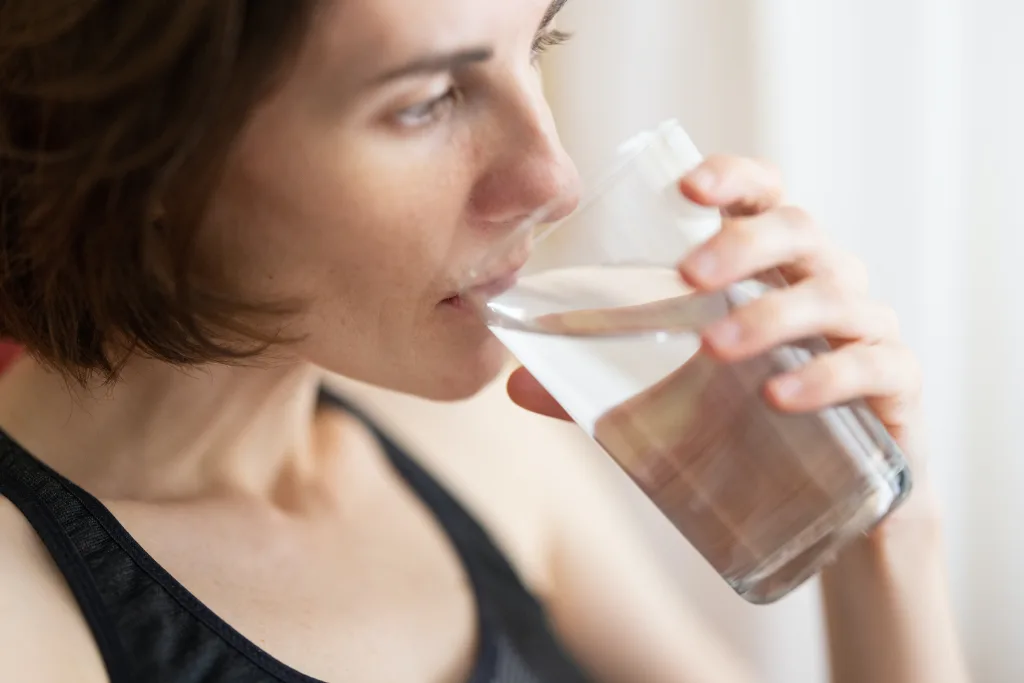Water is an essential component of our daily lives, and its importance cannot be overstated. Not only does it keep us hydrated, but it also plays a crucial role in maintaining our overall health and well-being. One aspect that often comes into question is whether drinking water can increase our glomerular filtration rate (GFR). In this article, we will explore the relationship between drinking water and GFR to shed light on this topic.
Firstly, let’s understand what GFR is. Glomerular filtration rate is a measure of how effectively our kidneys filter waste products from our blood. It is an important indicator of kidney function and can help detect potential kidney problems or diseases. A higher GFR indicates better kidney function, while a lower GFR may indicate decreased kidney function or potential kidney damage.
Now, the question arises: can drinking water increase GFR? The answer is not as straightforward as one might think. While staying adequately hydrated is essential for overall kidney health, there is limited scientific evidence to suggest that drinking water alone can directly increase GFR. However, it is important to note that dehydration can negatively impact kidney function and lead to a decrease in GFR.
When we are dehydrated, our blood volume decreases, and the concentration of waste products in the blood increases. This places additional stress on the kidneys as they work harder to filter the blood efficiently. By drinking enough water, we can maintain proper hydration levels and ensure that our kidneys can function optimally.
Furthermore, drinking water helps prevent the formation of kidney stones, a common condition that can impair kidney function. By staying hydrated, we can dilute the urine and reduce the risk of mineral deposits forming in the kidneys, thus promoting healthy kidney function.
It is important to note that while drinking water is beneficial for kidney health, excessive fluid intake may not necessarily lead to an increase in GFR. Our kidneys have a remarkable ability to regulate fluid balance in the body, and drinking excessive amounts of water may simply result in increased urine output without directly impacting GFR.
While drinking water is crucial for maintaining overall kidney health, there is limited scientific evidence to suggest that it directly increases GFR. However, proper hydration is vital to prevent dehydration and maintain optimal kidney function. By drinking enough water, we can support the kidneys’ ability to filter waste products effectively and reduce the risk of kidney stones. It is always advisable to consult with a healthcare professional for personalized advice on maintaining kidney health and optimizing GFR levels.
Can Hydration Increase GFR?
Based on the findings of the study mentioned in the previous response, it can be concluded that hydration can indeed affect glomerular filtration rate (GFR). The study observed the impact of hydration on GFR in fasting adults both before and after consuming a meat meal.
1. High Hydration: In fasting adults, high hydration levels were found to lower GFR. This suggests that increased fluid intake can lead to a decrease in GFR.
2. Low Hydration: Conversely, low hydration levels were found to increase GFR after a meat meal. This indicates that reduced fluid intake can result in an increase in GFR.
Therefore, it can be inferred that hydration plays a significant role in influencing GFR. The specific effects of hydration on GFR may vary depending on the individual’s hydration status and the presence of food in the digestive system.
Furthermore, the study also examined the impact of hydration on natriuresis, which refers to the excretion of sodium in the urine. The findings showed that high hydration levels increased natriuresis after a meat meal, while low hydration levels increased natriuresis during fasting.
Hydration can affect both GFR and natriuresis. High hydration levels were associated with a decrease in GFR during fasting and an increase in natriuresis after a meat meal. On the other hand, low hydration levels were linked to an increase in GFR after a meat meal and an increase in natriuresis during fasting.
Please note that this conclusion is based on the specific study mentioned and may not be applicable to all situations.

Should I Drink A Lot Of Water Before GFR Test?
It is generally recommended to drink plenty of water before a GFR test. Adequate hydration can help ensure accurate and reliable results. Drinking water helps to flush out your kidneys and can improve the efficiency of the GFR test. However, it is important to note that you should follow any specific instructions given by your healthcare provider. In some cases, they may advise you to restrict your fluid intake before the test. If this is the case, it is important to follow their instructions to ensure accurate results.
How Can I Increase My GFR Naturally?
Increasing GFR (glomerular filtration rate) naturally may be possible through various lifestyle changes and dietary modifications. Here are some strategies that may help improve your GFR:
1. Maintain a healthy blood pressure: High blood pressure can damage the kidneys over time. It is crucial to keep your blood pressure within a healthy range. Regular exercise, a balanced diet low in sodium, limited alcohol consumption, stress reduction techniques, and prescribed medications can help control blood pressure.
2. Stay hydrated: Drinking an adequate amount of water can help maintain kidney function. It is generally recommended to drink at least 8 cups (64 ounces) of water per day, but individual needs may vary. Consult with your healthcare provider to determine the appropriate amount for you.
3. Follow a kidney-friendly diet: Consuming a diet that supports kidney health is essential. This typically involves reducing the intake of sodium, phosphorus, and potassium. Including foods rich in antioxidants, such as fruits and vegetables, can also be beneficial. A registered dietitian can provide personalized recommendations based on your specific needs.
4. Exercise regularly: Engaging in regular physical activity can help improve overall circulation and cardiovascular health, which indirectly benefits kidney function. Aim for at least 150 minutes of moderate-intensity exercise per week, or as advised by your healthcare professional.
5. Maintain a healthy weight: Being overweight or obese can put additional strain on the kidneys. Losing weight through a combination of healthy eating and regular exercise can help alleviate this burden and improve kidney function.
6. Avoid smoking: Smoking can damage blood vessels, including those in the kidneys, and reduce overall kidney function. Quitting smoking or avoiding exposure to secondhand smoke can contribute to better kidney health.
7. Manage underlying health conditions: Certain medical conditions, such as diabetes and autoimmune diseases, can negatively impact kidney function. It is important to effectively manage these conditions through medication, regular check-ups, and lifestyle modifications to prevent further kidney damage.
8. Limit alcohol consumption: Excessive alcohol intake can lead to dehydration and adversely affect kidney function. It is recommended to drink alcohol in moderation, or avoid it altogether, depending on individual circumstances and medical advice.
9. Avoid over-the-counter nephrotoxic medications: Non-steroidal anti-inflammatory drugs (NSAIDs) like ibuprofen and naproxen can potentially harm the kidneys, especially when used excessively or for prolonged periods. Consult with your healthcare provider about suitable alternatives if you require pain management.
10. Get regular check-ups: Monitoring kidney function through routine blood and urine tests is crucial, especially if you have underlying health conditions or a family history of kidney disease. Regular check-ups can help detect any changes in GFR and allow for early intervention if necessary.
It is important to note that while these lifestyle changes and dietary modifications may help support kidney health and potentially improve GFR, they may not be sufficient to reverse significant kidney damage. Consulting with a healthcare professional or nephrologist is essential for proper evaluation and guidance based on your individual circumstances.
Can Dehydration Cause A Lower GFR?
Dehydration can indeed cause a lower glomerular filtration rate (GFR). The GFR is a measure of how well the kidneys are functioning and it indicates the rate at which blood is being filtered by the kidneys.
Dehydration occurs when the body does not have enough fluid to function properly. When a person becomes dehydrated, their body tries to conserve water by reducing the amount of urine produced. This reduction in urine output can lead to a decrease in the GFR.
The decrease in GFR during dehydration is primarily due to a decrease in blood volume. When the body is dehydrated, there is less fluid in the blood vessels, which leads to a decrease in blood flow to the kidneys. This reduction in blood flow to the kidneys can impair their ability to filter waste products and maintain normal kidney function.
Additionally, dehydration can also lead to an increase in the concentration of substances in the blood, such as urea and creatinine. These substances are normally filtered by the kidneys and excreted in the urine. However, when the kidneys are not functioning optimally due to dehydration, the levels of these substances in the blood can rise. This can be reflected in an increase in serum creatinine levels and a decrease in the estimated GFR.
Dehydration can cause a lower GFR by reducing blood volume and impairing kidney function. It is important to stay hydrated and maintain adequate fluid intake to support proper kidney function and prevent complications associated with dehydration.

Conclusion
Drinking water is essential for maintaining optimal kidney function and overall health. It has been observed that high hydration levels can lower the glomerular filtration rate (GFR) and increase natriuresis, which is the excretion of sodium in the urine. On the other hand, low hydration levels can lead to increased GFR and natriuresis after consuming a meat meal.
To prepare for a GFR test, it is important to follow the healthcare provider’s instructions, which may include fasting from food and only drinking water after midnight. It is also recommended to avoid consuming cooked meat the night before the test, as it can affect the creatinine levels in the blood and potentially impact the accuracy of the GFR results.
Improving GFR and preventing further kidney damage can be achieved through various measures. One crucial aspect is controlling blood pressure, which can be managed through lifestyle changes such as regular exercise, a healthy diet, stress reduction, and limiting alcohol consumption. Additionally, ensuring sufficient vitamin D levels and addressing any other underlying metabolic conditions can also contribute to maintaining kidney health.
It is worth noting that dehydration can lead to an increase in serum creatinine levels and a decrease in estimated GFR (eGFR). Therefore, staying properly hydrated is essential to support kidney function and prevent potential complications. Drinking an adequate amount of water throughout the day is recommended to maintain hydration levels and support overall kidney health.
